| Srl | Item |
| 1 |
ID:
140007
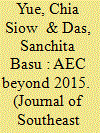

|
|
|
|
|
| Summary/Abstract |
This paper discusses Singapore’s progress in implementing the ASEAN Economic Community (AEC) and tries to explore whether the city-state has encountered any domestic conflict whilst doing so. It concludes that being a highly trade- and FDI-dependent economy, it is in Singapore’s national interest to be a part of the AEC. It is one of the leading ASEAN countries to implement the AEC initiatives. When examining domestic conflicts, Singapore presents a unique case as the city-state has long been exposed to the competitive forces of globalization, well before the development of the AEC. The country adopts non-protectionist measures to manage competitive pressures from the global economy. Almost full employment and a low incidence of poverty also minimize the negative impacts of liberalization. Case studies of the electronics and aviation sectors highlight how these two sectors are adjusting to liberalization and competition from the global economy, including the AEC. With respect to the electronics sector, which is an integral part of regional production networks, Singapore is continually progressing up the value chain. In the case of the aviation sector, the city-state continues to meet global and regional challenges through cooperative arrangements with the aviation industries of other countries and by upgrading and expanding its air services.
|
|
|
|
|
|
|
|
|
|
|
|
|
|
|
|
| 2 |
ID:
101989
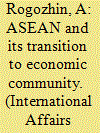

|
|
|
|
|
| Publication |
2010.
|
| Summary/Abstract |
WHAT DEFINITION would best reveal the nature of relationships existing today between the national economies in the ASEAN area? To our mind, it would be best to refer to regional economic cooperation between Southeast Asian countries and acknowledge its growing intensity and attractiveness for the participants.
|
|
|
|
|
|
|
|
|
|
|
|
|
|
|
|
| 3 |
ID:
112999
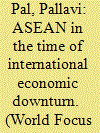

|
|
|
| 4 |
ID:
016267
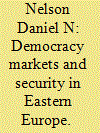

|
|
|
|
|
| Publication |
Summer 1993.
|
| Description |
156-171
|
|
|
|
|
|
|
|
|
|
|
|
|
|
|
|
| 5 |
ID:
103653
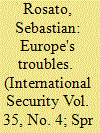

|
|
|
|
|
| Publication |
2011.
|
| Summary/Abstract |
The 1990s were years of great optimism in Europe. As the Europeans were putting the finishing touches on their economic community, observers predicted that political and military integration would soon follow. Optimism has turned to pessimism since the turn of the century, however. Most analysts believe that the economic community is in crisis, and hardly anyone predicts the creation of a political or military counterpart to it. Why has the European project run into trouble and what does the future hold? The answers to these questions are largely to be found in the distribution of power. It was the overwhelming power of the Soviet Union that drove the Western Europeans to consider a variety of integration initiatives and to build and maintain the European Community (EC) during the Cold War. In 1991 the collapse of the Soviet Union deprived them of a compelling geostrategic reason to pursue further integration or even to preserve their economic community. As a result, the Europeans have made no real effort to establish a political or military community over the past two decades, and the EC has slowly started to fray. As long as there are no significant changes in the balance of power going forward, worse times lie ahead.
|
|
|
|
|
|
|
|
|
|
|
|
|
|
|
|
| 6 |
ID:
133237
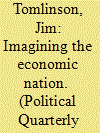

|
|
|
|
|
| Publication |
2014.
|
| Summary/Abstract |
The impending Scottish referendum on independence raises the question: what is a nation? This article addresses this question in terms of 'economic nationhood'. Tracing the development of the Scottish economy over the last century and a half, it shows how the extraordinarily 'globalised' economy of pre-1913 Scotland slowly evolved into a much more self-reliant entity. Today, Scotland has a de-industrialised and substantially de-globalised economy, with a very large public sector about which key decisions are made in Edinburgh. Scotland has become much more of an economic 'community of fate' than ever before in its modern history.
|
|
|
|
|
|
|
|
|
|
|
|
|
|
|
|
| 7 |
ID:
140009
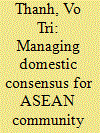

|
|
|
|
|
| Summary/Abstract |
Ever since the policy of economic renovation (Doi Moi) was initiated in 1986, comprehensive domestic reforms and proactive economic integration have been major pillars of Vietnam’s economy. Deepening cooperation and integration through the ASEAN Economic Community (AEC) framework lies at the centre of Vietnam’s trade and investment liberalization agenda. Any domestic reforms undertaken in the lead up to the announcement of the AEC by the end of 2015 should engage the ongoing economic restructuring process as well as the country’s growth paradigm. Reforms will also entail narrowing the development gap between Vietnam and more advanced ASEAN economies. The Vietnamese government has to weigh adjustment costs from reforms and greater liberalization as well as ensure that benefits are distributed among a diverse set of stakeholders in the domestic economy. Past experiences have shown that stakeholders can be sensitive to adjustment costs and accompanying uncertainties. This paper focuses on three key issues related to managing consensus during the community-building process: (i) increasing consultation with stakeholders during reforms; (ii) building community awareness of potential changes; and (iii) mitigating adverse impacts of reforms.
|
|
|
|
|
|
|
|
|
|
|
|
|
|
|
|
| 8 |
ID:
140008


|
|
|
|
|
| Summary/Abstract |
The ASEAN Economic Community (AEC) is Thailand’s current priority and the AEC Blueprint is being progressively implemented in the country. However, different domestic economic interests have contributed to the slow pace of implementation. Three case studies — the agricultural sector, the logistics industry, and the mobility of medical professionals — are used to illustrate this. To move the AEC beyond 2015 and to enhance consensus-building during the community-building process, this paper puts forth the following policy recommendations: (i) the Thai government should enhance awareness of the community-building process and convey more details about the AEC to stakeholders and the general public; (ii) closer consultation and more integrated relationships between the government and stakeholders should be fostered; (iii) the government should formulate policies to improve the competitiveness of the affected stakeholders and industries to reduce the adverse impact from the AEC.
|
|
|
|
|
|
|
|
|
|
|
|
|
|
|
|
| 9 |
ID:
092003


|
|
|
|
|
| Publication |
2009.
|
| Summary/Abstract |
The rollback of North Korea's nuclear program is closely interwined with the peace process in the Korean peninsula and resuscitation of the Nuclear Nonproliferation Treaty(NPT). With the recent thaw in U.S.-North Korea relations, a new opportunity is emerging for the two koreas and the United States. The international community and the concerned parties cannot afford another failure given the imminent danger of the current security siuation on the peninsula and the resulting pressing need for peace building. It is time for them to make a serious effort to bring about a Korean peace that would, in turn, contribute to peace, prosperity, and democracy in the region and the rest of the world. This article looks at policy alternatives that will effectively bring solid and lasting peace to the Korean peninsula.
|
|
|
|
|
|
|
|
|
|
|
|
|
|
|
|
| 10 |
ID:
117959


|
|
|
|
|
| Publication |
2012.
|
| Summary/Abstract |
In the last decade, West Africa emerged as a major transit hub for Latin American Drug Trafficking Organizations (DTOs) transporting cocaine to Western Europe. Since that time, there has been cause for hope and despair. The UN Office on Drugs and Crime (UNODC), the Economic Community of West African States (ECOWAS), and an array of international donors have made great strides in acknowledging the growing problem of drug trafficking and have implemented practical measures to stem this flow. All the while, the fears of many observers have been confirmed as the insidious effects of the drug trade have begun to take effect in many West African states. Consumption is on the rise and narco-corruption now undermines the rule of law and legitimate economic growth necessary for development and stability. One of the most alarming trends that place Africa and Africans on the radar of policy makers, law enforcement, and researchers alike is the number of new fronts on which the illicit drug trade is growing. Its geographic expansion beyond the relatively confined region of West Africa is now endangering East and Southern Africa. The arrival of new drugs to the region-heroin and Amphetamine-Type Stimulants (ATS, commonly referred to as synthetic drugs)-has been accompanied by the discovery of local manufacturing facilities to process them. Lastly, the growing level of involvement by Africans-who initially served as facilitators but now appear to be taking a more proactive role-raises concerns that a new generation of African DTOs is rising in the ranks. This paper examines how each of these trends are contributing to the twenty-first century expansion of the drug trade in Africa and summarizes some of the impacts they are having on the states and their populations.
|
|
|
|
|
|
|
|
|
|
|
|
|
|
|
|